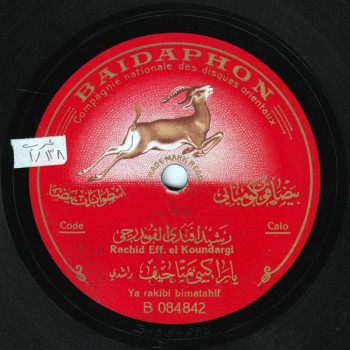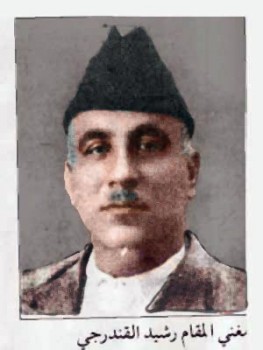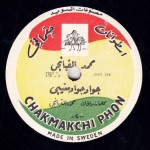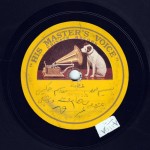 The Arab Music Archiving and Research foundation (AMAR), in collaboration with the Sharjah Art Foundation (SAF), presents “Durūb al-Nagham”.
The Arab Music Archiving and Research foundation (AMAR), in collaboration with the Sharjah Art Foundation (SAF), presents “Durūb al-Nagham”.
Dear listeners,
Welcome to a new episode of “Durūb al-Nagham”.
Today, we will resume our discussion about the “maqām irāqī” or “maqām baghdādī” or maqām in Iraq with Iraqi maqām muṭrib Mr. Ḥusayn al-A‘ẓamī.
Before we tackle the musical aspect, here is a last question concerning the social aspect:
Music books, including the non-specialized ones such as “Kitāb al-Aghānī”, state that music is “sung” –calling this the “science of singing” –, and that qaṣīda are “sung”…etc., except for the Kuran said to be “recited” in tartīl or in tajwīd.
Who, in the second half of the 20th century, stated that the maqām irāqī was “recited” by a qāri’ (reciter)? Doesn’t the maqām baghdādī or maqām irāqī belong to the science of singing? What is your comment on this?
Numerous maqām singers, writers, and critics still use the expression “Arabic maqām reciting”.
I am the only one who refuses to use the expression maqām qāri’ (reciter), using instead Iraqi maqām muṭrib or singer… Why?
What you said is true. I insist on using the expression “Iraqi maqām singer” out of respect for the solemnity or dignity of the term “reciting” that must be used exclusively for the tilāwa of the Kuran and of the various religious rituals. We say: “qāri’ (reciter) of the Holy Prophet’s manqaba, of the tahlīla, of dhikr al-Lāh (Remembrance of God), or of the madīḥ or Praise of the Prophet, Peace be Upon Him.
This person is sometimes referred to as the munshid.
Munshid… why not…. Let us call him qāri’ (reciter) since we are now focusing on Iraq.
The term qāri’ must remain exclusively religious, because the first qāri’ is the reciter of the Holy Kuran, thus one must respect the dignity of this term, especially that in the early 20th century –as I mentioned in my books–, the maqām irāqī was reborn and used in the music of wine poems, love poems, and all poetry subjects and types accompanied by musical instruments. It is thus not right to refer to the person singing wine poems or these other types of poems as an Iraqi maqām reciter or qāri’.
Why was he called a maqām qāri’ to start with? Did Iraqi maqām have a religious dimension and their singer was consequently referred to as a qāri’?
Let me explain this, Mr. Mustafa: Iraqi maqām were preserved thanks to religious rituals –Iraqi maqām are still performed in the Prophet’s manqaba sharīfa as well as in all the religious rituals–, and their performer, in this case, can be referred to as a qāri’. But it is unacceptable to refer to the person who sings wine poems, love poems, or romantic poems accompanied by music embellished with various ornaments and introduced by beautiful overtures as a qāri’. This person is a muṭrib, a performer, a singer of Iraqi maqām.
The origin of maqām, like the origin of any music, is indeed religious. Maqām, specifically, were preserved throughout the dark ages –mentioned earlier– thanks to the religious rituals without which everything would have ended and all the patterns would have been lost. People went on performing these religious rituals that carry major authority in societies. Religious principles are very rarely changed… Here lies the difference between the religious and the mundane.
Before discussing the maqām in Iraq from a musical perspective, let us listen to something.
Would you like to play something for us, or would you rather we played a full recorded maqām? Whose voice and which maqām would you choose?
As you wish.
Shall I choose something?
Please do.
Let us now listen to a beautiful maqām. We will discuss maqām from a musical perspective after this…
(♩)
Singing and music, the instrumental and the vocal… Tell us about maqām in this dialectic. Do not just present historical opinions… we would like to hear your personal point of view.
I specialized in Iraqi maqām. It is all I care about. I reached the top in sports as I was Iraq’s champion in wrestling and in Greco Roman wrestling. I also hold a national degree as a coach… Yet all this means nothing to me.
Touch wood.
I come from an athletic family. I played in the national team for 5 years until Munīr Bashīr pulled me away.
I have many hobbies:
In Arabic calligraphy, I completed the textbook of the great calligrapher Hāshim al-Baghdādī or Hāshim al-khaṭṭāt before I was 18, a very rare occurrence. I understood and learned all its rules –that I still remember, since “learning at a young age is like carving into stone”. This is the only hobby that I regret having let down: I could not practise it because I was fully dedicated to the Iraqi maqām that I could never let down. And thus, I left all my other hobbies, including swimming, other sports, wrestling, Arabic calligraphy…etc. I stopped everything else and dedicated myself to the Iraqi maqām, especially after the late musician Munīr Bashīr heard me in a concert, at a time when I was still an active wrestler. When I told him I was an athlete, he took me by the hand and told me this was not my place and that he would take me along with him to tour the whole world, because he was convinced I was made to perform Iraqi maqām, that this was my place, and that I had a beautiful voice…etc. He finally convinced me. I ignored his words the first time and left him, but he listened to me once again and told me harshly: “You must come to my circle tomorrow with all your details, address, workplace address…etc.”. He took me along with him on a month and a half long tour to through seven European countries. This tour changed my whole perspective on life and I decided to follow him even though I was supposed to go with the national team to Turkey to play against the Turkish team, but I apologized from the Iraqi Federation of Wrestling. It was a stroke of luck…
This happened in the 70s?
It was in the early 70s. Me, my whole life, my family, my region are all rooted in maqām… the maqām irāqī is all I care about. I wrote seven books, mostly studies… But as I told you, all my achievements besides those related to the Iraqi maqām mean nothing to me: I do not care to be called an author, an athlete, or a calligrapher, whereas being called a muṭrib of maqām irāqī is what my whole life revolves around.
I wish you health and a long life, and continuous success in singing, Mr. Ḥusayn.
May God keep you and protect you.
Let us talk about the belonging of the Iraqi maqām to the science of singing and music, about its journey from the mountains to Baghdad where it became a codified form. When did it complete this final stage?
This not happen overnight: it took centuries as well as going through different phases related to the various cultural, political, social, economic, and artistic periods. The life of the country depends directly on what happened there over the centuries and affected the journey of the Iraqi maqām up until today. The 19th and the 20th centuries witnessed many changes, mainly the 20th century’s scary and amazing evolution of technology that continues to be as amazing and scary today in the 21st century. What is the purpose of these scary industrial and technological developments for mankind?
Anyway, our point does not concern the negative and the positive facets of technology. Yet, the contemporary codified –in Baghdad –form of the Iraqi maqām was achieved thanks to the invention of the voice-recording device through which old voices were recorded, and that allows us to hear the voices of deceased artists, which was of course impossible before this invention. All that was performed before, over millions of years, is lost forever. We will never hear the voice of an 18th century artist. All we may learn is what is written by historians and that mainly consists of suppositions that changed and were magnified overtime and from one book to another until they became legends based on elements nobody ever heard or heard of. Today, thanks to this invention that put an end to these legends and marked a turning point in History, one can hear the voice of an artist one hundred or two hundred years later, and, provided one has the necessary culture, one can assess the vocal or musical abilities and quality of this artist.
The following is a subject that you, Mr. Mustafa, indicated but that we have not discussed in detail yet: vocal music and instrumental music. The maqām irāqī, not as a term, but as defined by its regional belonging…. The content of this distinctive and specific “term” is not the equivalent of the content of the Egyptian, the Lebanese, the Tunisian, or the Jordanian maqām –we will explain in which respect it is their equivalent– because it is a singing/vocal scale, knowing that Western Asia deals mainly with singing/vocal scales that are a direct product of the environment, i.e. environmental performances. The Egyptian baladī, for example, as well as the Gulf’s ṣawt or ṣawt khalījī, and the Aleppan qadd, are singing/vocal scales, not musical/instrumental scales, because they are a product of their milieu. So, the appellation maqām irāqī is the equivalent of, for example, the Aleppan qadd in Syria…
…Or the waṣla, or the faṣil.
Or the waṣla as it is called by our Arab brothers… There are various appellations indicating the same content. The appellation maqām irāqī corresponds to heritage music in the Arab World, such as the Egyptian baladī, the Aleppan qadd, the ṣawt khalījī, the Moroccan āla, the Algerian ghurnāṭī, and the Tunisian ma’lūf, as per the content.
The musical/instrumental scales are the melodies produced by an individual who takes the notes from a scale, not from a specific environment. Anyone can take his notes from a musical scale, whether it is the bayyātī, the huzām, or the rāst maqām, without specializing in the style of a specific milieu. These are general musical maqām. The typical ones are the singing/vocal scales. This is the difference between vocal scales and instrumental scales.
Anyway, the scale is only one of the elements defining the maqām, i.e. the maqām as a melody, not as the waṣla or as the maqām in Iraq, and can be shared by more than one maqām.
We have presented the elements of the maqām and explained them on different occasions throughout our shows, either in general or in detail.
Now, let us go back to the maqām irāqī.
The maqām irāqī…
Mr. Mustafa, you stated that maqām is the same everywhere in Western Asia. And indeed it is: the maqām performances are the common link in all of Western Asia, including Iraq. Let me tell you about my experience when I sang in different countries of Western Asia, including Azerbaijan where I was invited in 2009 to sing on the last evening of the festival. That same evening, Western Asia’s most famous muṭrib Mr. ‘Alīm Qasimov was supposed to sing, as well as an Iranian muṭrib with a beautiful voice called Muẓaffar whom I had listened to one month before my arrival to Azerbaijan, when we were both at the Oriental Landscapes Festival at the Damascus Opera House. So, on that evening in Azerbaijan, I was anxious and worried because I was confronted to great singers. I had heard both the Iranian singer and ‘Alīm Qasimov, and I was the last to sing after them, yet I drew the admiration of the audience, not necessarily because of my talent, but most probably thanks to the Iraqi style in singing maqām.
There are differences, of course, as Iraq’s geography is different from the geography of the other countries in Western Asia because it is located on the borders. Iraq enjoys an Islamic Arabic depth added to Western Asian influences. It is located halfway between these two geographies, which resulted in a blend of true Iraqi Abbasid singing/Baghdadi singing –the intellectual and scientific milieu of the city of Baghdad is the only ever-moving and ever-changing environment– with the fixed/set mountain milieu we described earlier, resulting in something that is different from the permanent set maqām and maqām performances in Western Asia: a codified maqām that was given the appellation “maqām irāqī”.
(♩)
Even the theory on Iraqi maqām is a little strange, closer on the one hand to the Persian and the Azeri or Azerbaijani theories, or the theories in Western Asia in general, and on the other hand closer to the modern Arab theory.
Mr. Mustafa, I will tell you now something I do not usually talk about and that I may have never talked about before: we must admit that singing in Iraq, notably the Iraqi maqām, was affected by direct and indirect influences from Western Asia, mainly from Turkey –which we share a 500km long border with– and Iran –which we share a 1000km long border with–. These direct borders have resulted in a continuous cultural communication and social, political interaction…etc., throughout history. While we belong to the Arab World. So consequently, we benefit from both. When the great artist Muhammad ‘Abd al-Wahāb was asked about the Iraqi song, he said that it carried as much weight as the Arabic song. He was of course referring to the scientific folkloric notion or concept of environments/milieus, highlighting Iraq’s unique feature that does not characterize the rest of the Arab World: a blend of Asian influences and Arab singing that produced a form that is different from both the Iraqi song and the Arab song. His answer illustrates perfectly what we are explaining about the Iraqi maqām.
The maqām irāqī includes non-Arabic words that were incorporated as a result of the Turkish and Persian influences. The non-Arabic language of the governors in Baghdad during the dark ages –before the Ottomans, the Safavid, and all the others occupiers we mentioned– blended with and was fixed in the Arabic language and notably in Iraqi singing –more than the singing in any other Arab region– because at the fall of the Abbassid Dynasty –seven centuries until 1958–, Iraq and the Arab World were under the authority of governors from Western Asia, and singers moved to Baghdad looking for their livelihood and to make their fortune, so they started to sing in their governors’ language.
To get close.
To get close and to make money. This is how a number of non-Arabic words entered the core of Iraqi maqām.
It is not disgraceful.
It is a fact. And, unfortunately, things did not stop there as the non-Arabic language also affected the science of music. Today, most appellations of the Arab music scale-steps are non-Arabic terms, either Turkish or Persian. Mr. Mustafa, as an Arab and an Egyptian, will understand that I blame Cairo’s 1932 Congress of Arab Music. This was a golden opportunity to bring back the Arabic appellations of the music scale steps. The non-Arabic words were unfortunately kept and have become today a subject that is taught by and to all musicologists and music students in the Arab World.
The only appellations the Congress added are western appellations.
Yes.
No comment.
Of course.
The beginning of the 20th century witnessed the birth of a new Arab nationalist Nahḍa or renaissance aiming at clearing Iraqi maqām singing from these non-Arabic words. Yet the achievements of those who undertook this initiative, including al-Qubbanjī, some singers, and critics, were aesthetic, not intellectual: they removed the non-Arabic words they did not like and kept those they liked. The Arabisation –the removal of non-Arabic and non-Iraqi flaws– of the maqām irāqī was not done from an intellectual perspective.
Since the disc of the Fifth Asian Forum held in Australia, I recorded a disc of a maqām ṣabā free from any non-Arabic words and I haven’t pronounced one non-Arabic word in all my interpretations since then. I am trying, from a nationalistic perspective, to Arabize the singing of the maqām irāqī. I think that this patriotic and intellectual approach is necessary to liberate the psychological factor and keep it from being scattered, even unconsciously, in order to maintain our awareness and Arabize these maqām into purely Arabic qaṣīda.
There are different opinions:
Some –whom I agree with as I can’t be neutral– say that the birth of literary music or maqām music is one unique birth, whether it is sung in Arabic, Turkish, Persian, in any other language, or in any other local Arabic or non-Arabic dialect. So I do not understand why the Persians wish to remove Arabic words from the dastkāh, and the Turks wish to remove Arabic words from the fāṣil, and why we wish to remove the non-Arabic words, Turkish or Persian, from our waṣla or from the Iraqi maqām…etc.
(♩)
Dear listeners,
We have reached the end of today’s episode of “Durūb al-Nagham”.
We thank Mr. Ḥusayn al-A‘ẓamī and all those who lent us their recordings. As we mentioned previously, our episodes include recordings from the music libraries of Sheikh Khālid āl Thānī, Prof. Muḥammad al-Sabkī, and Mr. Aḥmad al-Ṣāliḥī, added to the acquisitions of AMAR.
We will meet again in a new episode of “Durūb al-Nagham” to resume our discussion about the maqām in Iraq.
“Durūb al-Nagham”.
- 221 – Zakariyya Ahmed – 12 (1/9/2022)
- 220 – Zakariyya Ahmed – 11 (1/9/2022)
- 219 – Zakariyya Ahmed – 10 (11/25/2021)
- 218 – Zakariyya Ahmed – 9 (10/26/2021)
- 217 – Zakariyya Ahmed – 8 (9/24/2021)
- 216 – Zakariyya Ahmed – 7 (9/4/2021)
- 215 – Zakariyya Ahmed – 6 (8/28/2021)
- 214 – Zakariyya Ahmed – 5 (8/6/2021)
- 213 – Zakariyya Ahmed – 4 (6/26/2021)
- 212 – Zakariyya Ahmed – 3 (5/27/2021)
- 211 – Zakariyya Ahmed – 2 (5/1/2021)
- 210 – Zakariyya Ahmed – 1 (4/28/2021)
- 209 – W-al-Lāhi lā astaṭī‘u ṣaddak 2 (4/6/2017)
- 208 – W-al-Lāhi lā astaṭī‘u ṣaddak 1 (3/30/2017)
- 207 – Bashraf qarah baṭāq 7 (3/23/2017)



